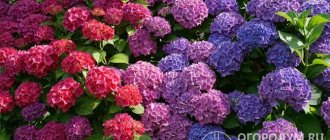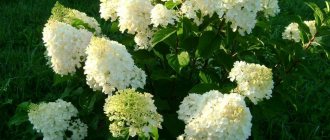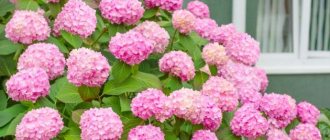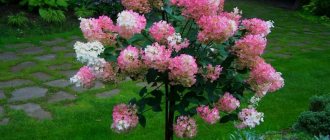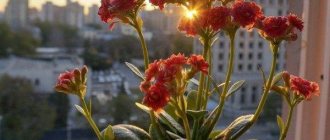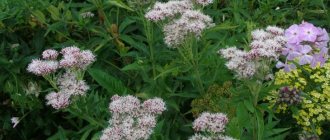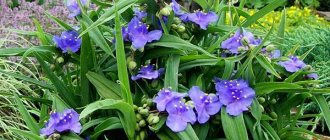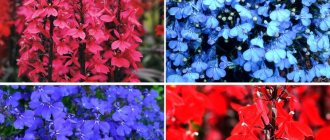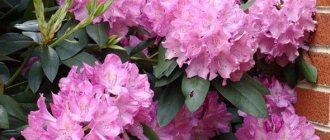Hydrangea is often used to decorate flower beds and lawns in the private sector. This plant is quite bright and attractive. But most inexperienced gardeners sometimes have a question: for what year does hydrangea bloom after planting, and how much care does it require?
This article discusses all the rules for planting and caring for a garden plant so that it pleases its owners with an attractive appearance.
Garden hydrangea
Choosing a healthy seedling
All beautiful hydrangea bushes start with a small seedling. How well the plant will take root in a new place and will delight you with large inflorescences depends on its condition. Therefore, we immediately remember the basic rules for choosing a seedling:
- You need to buy from nurseries and online garden stores.
- You need to choose seedlings with a closed root system. The pot will allow you to keep the hydrangea until the frosts have completely subsided.
- To check the root system, the plant is carefully pulled out of the container along with a lump of earth. The roots should be healthy, moist, without dry shoots, signs of rot or mold.
- The optimal size is 2-4 even, strong shoots.
- For greater guarantee, you can wait until the end of May or the beginning of July and buy a plant that is already vegetating.
- The health of hydrangea is indicated by symmetrical elastic leaves of a rich green color.
Features of hydrangea flowering
Most often, deciduous flower varieties are grown in Russia - they bloom in early summer until the first frosts in autumn. Its flowers are collected in inflorescences - some larger, others smaller, forming a panicle or spherical shape.
The inflorescences can have a wide variety of colors - white and cream, pink and dark gray.
Shades may vary depending on the soil in which the plant is planted:
- if it is planted in neutral soil, the flowers will be light, white or cream;
- with increased acidity it will bloom with bright blue shades;
- at an alkaline level it will be lilac or pink tones.
For what reasons does hydrangea not bloom?
Often a bush does not bloom and in order to make it bloom it is worth finding out the reasons by eliminating them:
- Lack of fertilizer or excessive application of potassium and phosphorus to the soil.
- Excessive pruning of the crown, which does not allow the inflorescences to develop.
- Improper care before wintering or insufficient shelter can cause freezing of the shoot and root system.
- If the buds are damaged - frost, improper pruning or harmful insects.
How to get hydrangea to bloom in the garden?
If it is planted in the ground, you can use the following tips and recommendations to speed up flowering:
- Carry out an early suspension of its growth in November-December, in which case the bush will bloom in early to mid-March.
- To speed up watering, the plant is watered with warm water, the temperature of which is 34-36 degrees.
- When the first shoots and foliage appear, the frequency of watering is doubled, using additional spraying with warm water.
If a flower grows outside in a tub, you can use these techniques to speed up flowering.
- Give the plant a warm bath - place the flowerpot in a basin with warm water, temperature 36-38 degrees, for 8-12 hours.
- If you want to achieve flowering in winter, on New Year's Eve, increase the lighting, bringing it to the length of the summer day, up to 10-14 hours.
Flowering indoor hydrangea
To make your indoor bush please you with abundant color, you should take into account the following recommendations:
- An adult plant is cut 20-25 cm from the ground, planting it in the ground for the winter.
- Next, cover it with spruce branches and dry leaves, and when you open it in the spring, cut it down to ground level.
- At the end of August - beginning of September, plant the hydrangea in a tub.
Ideal place for hydrangea
Hydrangeas are not the most capricious flower, but their location is key. Here you will have to come to terms with it and plant it not where you want, but where it will be best for the plant.
- For paniculate varieties, you need to choose a place with partial shade. In strong sun it shrinks and degenerates, but without light it also feels bad.
- It’s the same with tree hydrangea - the plant loves moderate sunlight without scorching direct rays. Ideally, bushes should be planted near shrubs and trees that will provide them with the necessary protection.
- Petiolate (creeping) species tolerate shade best. They grow well near walls and high fences. Good soil permeability is important for hydrangea.
Where to plant hydrangea
The question of where to plant hydrangea: in the shade or in the sun is quite relevant and interests many lovers of these flowers. This is not surprising, because lighting is one of the main factors that influence the flowering and development of a plant.
Gatsania flower - how it blooms on a club, what soil is needed for growing
In conditions of constant deep shade, hydrangea grows well, gains green mass, but does not form flower stalks. In such conditions the plant will not bloom.
Is it possible to plant hydrangea in the sun? It all depends on the duration and angle of sunlight hitting the plant. With constant light, hydrangea succumbs to stress, flowering becomes short-lived and faded. Direct sunlight burns the leaves and prevents flower stalks from developing to their full potential.
Attention! Hydrangea loves the sun, but the light should be diffused and not scorching. The best option is morning and afternoon lighting. The culture grows well in a slightly shaded place, protected from drafts.
Planting hole size
For active growth and flowering, hydrangea requires nutritious soil. To grow it in areas with poor soil, it is necessary to thoroughly fertilize the planting hole. For a young seedling, prepare a depression measuring 30x30 cm and 40-50 cm deep.
For mature plants, a wider hole will be required. The pit is enlarged if the soil has to be conditioned by adding sand, humus or a nutrient mixture. A distance of 1.5-2.5 meters is maintained between adjacent holes so that adult plants do not interfere with each other.
Proven types of hydrangea
The most unpretentious species are tree hydrangea and paniculata hydrangea. Experienced gardeners usually have no problems with them. Know to water yourself without sparing, fertilize when necessary, and prune if the bush is thickened and the inflorescences are crushed. These hydrangeas overwinter in the middle zone without shelter, but to the north they freeze without it.
Species hydrangeas are gradually being replaced by varieties. Among tree hydrangeas, the most famous is Annabelle, with large caps of snow-white inflorescences. The bush is spreading, in favorable conditions it grows up to 1.5 m. The branches often bend under the weight of the inflorescences, especially after rain. Almost equally popular are Grandiflora with cream and Sterilis with white-green, then whitening petals.
But here are the lesser-known new items: Hayes Starburst with white double flowers, Incredibol / Abitu (first lemon green, then white, and green in the fall). And, of course, pink Invincibelle Spirit!
The most common decorative form of paniculata hydrangea is Grandiflora. When blooming, its inflorescences, up to 30 cm long, are creamy white, then pure white, later turn pink, and in the fall they become greenish-red. Take a closer look at other varieties of paniculata hydrangea. For example, to the dwarf Bobo with a height of 60 - 70 cm. The inflorescences abundantly covering the bush are first in lemon-green tones, then turn white and even slightly pink. Slightly larger than Little Lime. In partial shade, the flowers of this hydrangea are greenish all season, and in the sun by autumn they acquire a pinkish tint. Weems ed / Farbsymfony is larger, 1.5 - 2 m high. The blooming flowers are first creamy white, then pink and wine red by autumn.
Frost-resistant large-flowered hydrangeas
New – hydrangea Endles summer (Endless summer). Pink and blue. Blooming on the shoots of both last and current years! That is, it is remontant and also winters normally in the middle zone. True, with cover.
There are also Tweets and Shout blue and Tweets and Shout pink. And also the Expression variety: its graceful flowers are violet-blue in acidic soil and pink in alkaline soil. All of them can withstand up to -29 °C.
That is, a gardener who takes care of a winter shelter for hydrangea will be able to admire the flowering from July to September - October! The main thing is to open them on time, but not too early in the spring, and in the summer, especially hot ones, to pamper them with watering.
Can I plant in the shade?
Hydrangea is quite shade-tolerant. But the less light, the worse the flowering, and the more sun, the more abundant watering should be. So compromises will have to be made. In the southern regions, plant so that at noon the hydrangea is hidden in partial shade, otherwise you won’t get enough water, and the inflorescences may burn out from direct sun. And in the middle zone it is better to choose a place that is sunny or shaded for a small part of the day.
You definitely can’t plant it with large water-bearing trees, and hydrangea doesn’t get along with a powerful specimen of the girl’s grape; in the summer it won’t have enough moisture even with regular watering. The exception is a very damp area.
Proper fertilizer when planting
Suitable soil is rare, but it can be adapted so that the hydrangea takes root and begins to grow immediately. For drainage, sand or broken bricks are poured into the bottom of the hole.
The remaining volume is filled with a substrate of excavated soil, humus and high-moor peat. This composition will allow you to grow hydrangea even in a clayey place with poor soil. Recommended proportions: 2 parts each of turf soil and humus and 1 part each of clean sand and peat.
Before planting the seedling, the earthen ball should be lightly shaken off so that the roots straighten and grow faster. The plant goes deep into the prepared nutrient “cocktail” to the level of the root collar.
What year does hydrangea bloom after planting?
As a species, hydrangea can be represented in several forms:
- a bush that forms a fairly spreading form, up to 2 m high;
- a low-growing form of tree, varying in height from 2 to 2.5 m;
- liana-like form, which is capable of expelling a main branch 30 m long.
In their garden plots, gardeners prefer to grow the deciduous form of the plant in the form of a bush, although in nature there are also evergreen varieties of hydrangea.
The leaves of the shrub form can be very different in shape - oval, elongated, have a jagged edge or brightly traced veins.
The inflorescences are quite large, and their shape can be:
- spherical;
- elongated;
- corymboid;
- fruitful.
Corymbose inflorescences of the plant
As for the color, it can be very diverse: from white to deep purple, plain or tinted (when the color changes as the buds bloom).
Note! Flowering occurs in the warm season. It may vary depending on the variety of hydrangea, but in the vast majority of cases it begins in mid-spring and ends with the beginning of autumn.
In addition, many gardeners are also concerned about this point: in what year does hydrangea bloom after planting a cutting?
It is worth noting that if a hydrangea is planted in the autumn, then in most varieties the inflorescences will begin to form the next summer, that is, in fact, when the plant is not yet 1 year old.
But there are other varieties that take several years to produce their first buds.
Flowering calendar for garden hydrangea varieties
Growing hydrangea is not difficult, but it is important to choose the variety that is suitable in each specific case, taking into account its flowering period.
For example, the tree variety is characterized by cold resistance and lush, massive flowering, which lasts from June to the end of September.
Paniculata hydrangea can bloom only in the fourth year after it was planted. As for the duration of flowering, this plant will bloom in July and fade by the end of October. There are a wide variety of paniculate hydrangea varieties, which differ in different flower colors.
Important! This subspecies (for example, the Vanilla variety) is distinguished by the fact that the color of the flowers changes as each flower lives. For example, a white bud that appears will gradually acquire a rich pink hue.
Variety Vanilla
Large-leaved hydrangea has a short flowering period, which lasts about a month (from approximately July to August).
The serrated subspecies has white or blue flowers. It blooms for about 2-3 months, depending on the conditions created.
Hydrangea radiata is distinguished by snow-white flowers that will delight the owner of the garden for 2 to 3 months.
The oakleaf subspecies has snow-white formed inflorescences that gradually change their color, first to pink, and then to a rich purple color.
Why doesn't hydrangea bloom?
There are several reasons why a plant does not bloom, most of which depend on the variety:
- for example, paniculate hydrangea buds may simply freeze over during wintering, so you won’t have to wait for color in the current summer season. Also, the absence of panicles may be caused by inappropriate soil composition;
- large-leaved - may also not survive the winter well, which will negatively affect the formation of color. It should be noted that the plant produces buds only on last year’s branches, so pruning must be done very carefully so as not to rid yourself of the beautiful appearance of the flowering bush;
- Tree hydrangeas, such as the Anabelle variety, may also have trouble blooming. In addition to standard freezing, which is inherent in all subspecies of this plant, the reason may be improper watering. If the soil is too dry, the bush will develop very slowly and will not throw out buds.
Causes such as diseases and various types of infections may also be common to all types. Fungus, powdery mildew or gray mold have a very negative effect on the bush, including its flowering.
Necessary conditions for hydrangea flowering
Many inexperienced gardeners do not know where to plant hydrangea: in the shade or in the sun. This is a very important parameter on which a lot depends.
Hydrangea loves well-lit areas, open but without drafts. At the same time, if direct sunlight falls on the plant for a long period of time, this will negatively affect the appearance of the bush.
Optimal growing location
It is also necessary to select a site whose soil will meet the requirements. It should be slightly acidified and not heavy. The plant does not tolerate clay soils very well. If the land does not comply, then you will have to bring it to the required parameters by adding certain purchased factory microelements, a small amount of sand and peat.
Common mistakes when planting hydrangeas and how to avoid them
Not everyone knows how and where to plant hydrangea: in the shade or in the sun, so that it produces lush flowers.
If such a beauty grows in the garden, but the problem is that it does not bloom, it means that it was not provided with the appropriate conditions. Most likely, the place is too shady for her. The fact is that the bush is quite sensitive to the amount of lighting. If there is not enough sun, the bud simply will not form.
There is another common mistake that inexperienced amateur gardeners make. They place other garden crops too close to the hydrangea. As a result, intertwining, the root systems do not allow each other to fully develop. Therefore, in order for it to bloom, it is necessary to grow it at a certain distance from other neighbors.
Useful tips and some secrets of caring for paniculata hydrangea
First of all, a gardener needs to know whether hydrangea loves sun or shade. In this case, the amount of sunlight should be abundant, but with slight shading, occurring during the period when the sun is at its zenith. These are the most suitable conditions for garden hydrangea to bloom abundantly and for a long time.
If the plant nevertheless begins to bloom, but forms rather small brushes or spheres, then the reason may lie in the fact that the soil does not have enough minerals that provide nutrition to the plant. But you need to be careful with nitrogenous fertilizers, as they affect the amount of green mass formed, and, on the contrary, have a negative effect on the formation of flowers. With hydrangea, you need to adhere to the principle - it is better to underfeed than to overdo it in adding nutrients, be they mineral or organic.
It is also necessary to adhere to the recommended pruning pattern. This will not only help to form a visually attractive bush, but will also contribute to the formation of a large number of flowers.
Frequency and abundance of watering
For their love of moisture, hydrangeas are given the name Hydrangea (water container), so be prepared for frequent watering. Bushes should not be planted in an area where the owners visit only on weekends. For irrigation, you need settled, lukewarm water from the tap or collected rainwater.
When planting, the bush is only sprayed. In the next 2 weeks, the plant is watered once every 2-3 days. Next, simply keep the soil moist, preventing it from drying out. To protect from drying out, the surface around the hydrangea is slightly compacted and mulched with bark, sawdust or pine needles.
What does hydrangea like?
Before planting hydrangeas, it is necessary to take into account the preferences of the crop.
The gardener needs to keep in mind the following nuances:
- Since the hydrangea rhizome grows widely, the plant requires sufficient space on the site.
- Hydrangea prefers humidity. The crop needs frequent watering, but to reduce evaporation from the soil, it is recommended to apply mulch from pine needles to the tree trunk. It should be remembered that watering must be carried out so that there is no stagnation of water.
- The culture needs light and protection from direct sunlight. Hydrangea grows and blooms well in areas with diffuse sunlight, as well as in partially shaded areas.
- Hydrangea prefers well-drained, nutritious soil with high acidity, containing clay particles without excess lime. You can improve the soil composition with compost or humus.
Protection from pests and diseases
For 2-3 years after planting, hydrangea bushes do not require pruning, and the substrate rich in nutrients is enough for the full development of the plant. But the flower may suffer from pests.
Wet soil promotes the development of rot and fungal diseases. If a whitish coating, rusty spots or causeless wilting of foliage appears, you need to remove all damaged parts and treat the hydrangea with a fungicide.
Insecticides help against pests. To combat diseases due to improper care, adjustments are made: hard water is replaced, the amount of fertilizer is reduced.
Caring for garden hydrangea: growing secrets
Caring for a flower consists of watering, fertilizing, pruning and preparing for winter. Spring is the best time to add mulch to the tree trunk for greater moisture retention. Spread sawdust, peat, pine needles or wood chips in a 7-8 cm layer, with a diameter of 24-30 cm.
Top dressing
When planting hydrangeas in a soil mixture with fertilizers, you do not need to feed them for the first two years. The general rule of fertilizing is acidic fertilizers (ammonium sulfate, potassium sulfate) before July, and potassium-phosphorus fertilizers (bone meal, superphosphate) from July to October.
The plant's need for nutrients is high as it grows quickly and blooms powerfully.
- Complex nutrition for growth. In early - mid-May, feed with complex mineral fertilizer - 25-35 grams per 10 liters of water. Or separately a tablespoon (15 g) of urea + 25-30 g of superphosphate (2 tablespoons) and a tablespoon (15 g) of potassium sulfate. Mineral fertilizers can be supplemented with organic fertilizers: infusion of mullein or bird droppings - 1:10. Repeat feeding after 13-16 days.
- Potassium-phosphorus fertilizer for flowering. 12-16 days before flowering (beginning - mid-June), liquid fertilizing is carried out: dissolve 65-75 g of superphosphate and 41-49 g of potassium sulfate in water and water the bush.
- During flowering. Repeat the previous feeding at the time of mass flowering to prolong it and ensure the formation of new flower buds.
- It is not recommended to use wood ash for feeding. Fertilizers are well suited for heather species and rhododendron.
- Avoid excess nitrogen, which leads to reduced winter hardiness, poor flowering and promotes the development of rot. Apply only in April - May.
- Important! An excess of fertilizers, especially organic ones (mullein, manure), will do more harm than a deficiency.
Watering hydrangea
The flower is moisture-loving and needs regular watering. Drought is contraindicated; lack of sufficient moisture leads to impaired development.
In dry and hot weather, water every 7-8 days with 15-20 liters of water. The usual schedule is 15-25 liters of water every 13-16 days, and if there is a rainy summer, then 4-5 times per season.
Lack of moisture in the fall reduces the winter hardiness of the plant, so if there is little rain in the fall, additional watering is required.
Periodically add 2-3 grams of potassium permanganate to the water for irrigation to prevent the development of rot. Soft water is best for irrigation.
We recommend reading: “ WATER FOR WATERING PLANTS, WHICH IS BETTER? »
It is better to water in the morning or evening near the tree trunk, when there is no scorching sun. After each watering, it is advisable to loosen the soil 5-6 cm deep around the plant.
Preparing for winter
Many hydrangea varieties are acclimatized for countries with cold climates. For successful wintering, young plants must be insulated. The roots may not be affected, but the young shoots will die from frost.
In the southern regions, hilling is sufficient, but in the northern regions it is necessary to cover with spruce branches, peat and film. The plant can also be placed in a rigid frame and covered with dry leaves or wrapped in hay or straw.
If you figure it out, taming the whimsical hydrangea is not at all difficult. We have broken down the first year of life from planting in open ground to wintering into simple recommendations that will help you grow a beautiful flowering bush from a small seedling.
Useful tips and secrets of care
Caring for thuja in spring and after planting outside
In order for the hydrangea bush to bloom at the right time and for a long flowering period, experienced gardeners advise following some recommendations:
- Feeding is carried out twice. In the spring, nitrogen fertilizers are applied - for the development of the root system and leaf mass, in the summer - potassium preparations (they help strengthen the plant and long-term flowering). In autumn and early spring, organic fertilizer is used: manure, ash, humus.
- The soil is slightly oxidized. To do this, aluminum alum or chelated fertilizers are added to the soil. At home, coffee grounds, tea leaves or citric acid are used. In order to avoid soil alkalinity, it is recommended to replant the indoor plant regularly. It is advisable to mulch garden hydrangea with sawdust and conifer bark.
- When planting a purchased seedling, do not destroy the lump of soil in which the root system of the plant is located. For easier adaptation, gardeners often use the peri-root nutrition method: a small trench with a radius of 20-25 cm is formed around the roots of the hydrangea, into which humus or manure is placed. In this way, plant growth is stimulated and the root system develops. This method of fertilization is also used when it is necessary to transplant a seedling.
Planting a bush
- You can grow a seedling yourself; this material is stronger, easier to master and grows well. Hydrangea is propagated by seeds, cuttings and dividing the bush. Growing a crop by sowing is a rather difficult and painstaking task. It is easier to use the cutting method: a healthy pagon with 2-3 buds is cut off and placed in water. After some time, the cutting is planted in a pot or in open ground in the fall, covered with a glass jar.
- Most hydrangea varieties are pruned in the spring. Any manipulations in the autumn can lead to damage and frostbite of young pagons.
Clipped hydrangea
Advice! Some gardeners do not even remove the last inflorescences - it is believed that they are able to preserve the plant in severe frosts. In autumn, old plantings are rejuvenated.
- Mandatory insulation of bushes for the winter period. It is necessary to mulch the hydrangea, remove the leaves, carefully bend the branches and cover the plant with branches of coniferous trees.
Mulching for the winter
- Adding potassium permanganate to the water when watering and regularly loosening the soil will help to avoid rotting of the roots.
Advice! Hydrangea flowers do not have a pronounced aroma, do not attract bees, and can be planted near paths, windows, and doors.
Flower by the path
Soil composition
The soil should be light, nutritious, permeable and acidic.
Peat chips, compost and crushed pine needles are poured into the hole before planting the bush. Soil acidity is increased using ammonium sulfate, sulfuric acid or ferrous sulfate. They are part of most complex fertilizers.
Drainage is made from a mixture of fine expanded clay and leafy soil. Hydrangea grows well on loam, but it is not suitable for rich black soil. Ideal soil composition:
- turf land;
- peat crumb;
- leaf humus;
- coarse sand;
- black soil mixed with coarse sand.
The main components are taken in equal quantities.
Shelter for the winter is necessary to prevent the bushes from freezing
Rules and terms of feeding
The main rule that must be followed when caring for hydrangea. It is better to apply less fertilizer than to exceed the permissible rate. Feed from March to October.
If a gardener grows some exotic variety, then it should be fed only after consulting with specialists who already have experience in growing it.
How to plant a flower bush correctly
When planting hydrangea on a site, it is important not only to take into account favorable conditions for the plant, but also to follow all the rules for planting it. The sequence of work is as follows:
The sequence of work is as follows:
- determining the planting site, future location of hydrangea bushes, checking the soil for pH;
- digging holes for planting measuring 40cm*40cm*40cm for young seedlings, 50cm*50cm*50cm for perennial shrubs, maintaining a distance of about one and a half meters between them;
- filling planting holes with enriched soil mixed with mineral fertilizers;
- formation of hilly hills from soil in depressions;
- pruning elongated roots of young seedlings;
- pruning shoots and dried inflorescences from old bushes if planting is done in the fall;
- location of seedlings on hills, straightening of roots;
- filling the depressions with the remaining soil, while the last layer should not cover the root collar of the bush;
- abundant watering;
- soil compaction;
- mulching with tree bark and sawdust.
Methods of propagation of paniculata hydrangea
Hydrangeas bred by breeders reproduce exclusively vegetatively. Only these methods guarantee the preservation of varietal characteristics:
- Cuttings. The method gives almost 100% results. Planting material is cut from the bushes in early June. The average cutting length is 10–12 cm, 3–5 growth buds are required, the leaves are cut in half. The lower cut, made at an angle, is immersed in a solution of any biostimulant for a day. The cuttings are rooted in a damp mixture of peat and sand (1:1), planted in separate containers. A “greenhouse” of plastic bottles will speed up the process. They are planted in a permanent place next spring or a year later.
Hydrangea paniculata cuttings root successfully in the vast majority of cases
- Rooting cuttings. Gives the desired effect in 50–60% of cases. In mid-spring, last year's flexible shoot is placed on the ground in a pre-dug groove up to 7 cm deep and fixed in this form, having previously cut the bark from below by about 1 mm. The cut site is sprinkled with humus and watered abundantly during the summer. By autumn, shoots should appear there. In this case, the plant is separated from the mother specimen in the spring and transferred to the selected location.
Propagation of hydrangea paniculata by layering is a method that requires minimal time and effort, but does not always lead to success
Care after flowering
After flowering is complete:
- Remove dried flower stalks.
- Fertilize the plant. They are fed to stimulate the growth of new shoots and protect against rapid growth of shoots; they should not stretch.
- Bushes are being spudded. New soil is poured under each one, making a slide.
- Mulch the soil. A mixture of compost, manure, peat and humus is poured under each bush in a layer of 5 cm.
Removing old flower stalks is necessary to protect the plant. The panicles, swollen from rain and snow, become very heavy. The stems cannot support the weight and break.
At the end of October, hydrangea is protected from frost. If the winter is snowy, then some varieties can be left without artificial shelter, constructing it from snow. Tree, ground cover and tree hydrangeas tolerate cold well.
Removing panicles
How to care for a plant.
If you properly care for your hydrangea, then no problems will arise with the bush, and after a while you will be able to enjoy flowering. 1
It is very important to water your hydrangea regularly. This plant loves moisture very much, so the soil under the bush should not dry out.
A young plant will need 1.5-2 buckets per week, and an adult bush will need at least 3 buckets of water. Of course, the volume and mode of watering must be adjusted depending on the weather: in hot summers, water the hydrangea more often, and in rainy weather you can refuse watering altogether. Water used for irrigation must first be settled. 2. After you have watered the hydrangea, you must definitely loosen the soil and pull out the weeds. 3. In the first year after planting, you will not need to feed the hydrangea - it will only need the fertilizer that you added to the planting hole. Starting from the second year, the bushes begin to be fertilized; you can use both organic and mineral fertilizers. In the spring, hydrangea needs nitrogen fertilizers, and in early summer - potassium-phosphorus supplements. The last feeding should be done in September, again using potassium and phosphorus, this will help the hydrangea gain strength before winter and ensure flowering next year. 4. Pruning a plant is one of the most important care procedures. It is important to know what type of hydrangea you have growing, whether it forms flowers on young branches or on last year's shoots. Often gardeners, out of inexperience, prune hydrangea branches and wonder why flowering does not occur for several years. The problem is that they cut off the shoots with flower buds, without giving the hydrangea the opportunity to bloom.
Cosmetic pruning can be carried out at any time; this gentle procedure is carried out only when necessary and includes the removal of frostbitten, broken and diseased branches, as well as the removal of faded inflorescences. Formative pruning is carried out only in early spring, before the plant wakes up and sap flow begins. 5
It is important to pay enough attention to the preventive treatment of the plant, then you may not have to deal with diseases and harmful insects. Do not allow plantings to thicken, remove weeds in a timely manner. In the spring, you can carry out preventive spraying of hydrangea with the drug "Fundazol" or a weak solution of potassium permanganate
If aphids or spider mites are found in small quantities, you can resort to folk remedies (infusion of wormwood, garlic, soapy water). If the insects have already spread throughout the plant, then the chemical preparations “Aktellik” or “Aktara” will help you. When using fungicides or insecticides, it is very important to follow the dosage indicated in the instructions and use personal protective equipment
In the spring, you can carry out preventive spraying of hydrangea with the drug “Fundazol” or a weak solution of potassium permanganate. If aphids or spider mites are found in small quantities, you can resort to folk remedies (infusion of wormwood, garlic, soapy water). If the insects have already spread throughout the plant, then the chemical preparations “Actellik” or “Aktara” will help you.
When using fungicides or insecticides, it is very important to follow the dosage indicated in the instructions and use personal protective equipment
